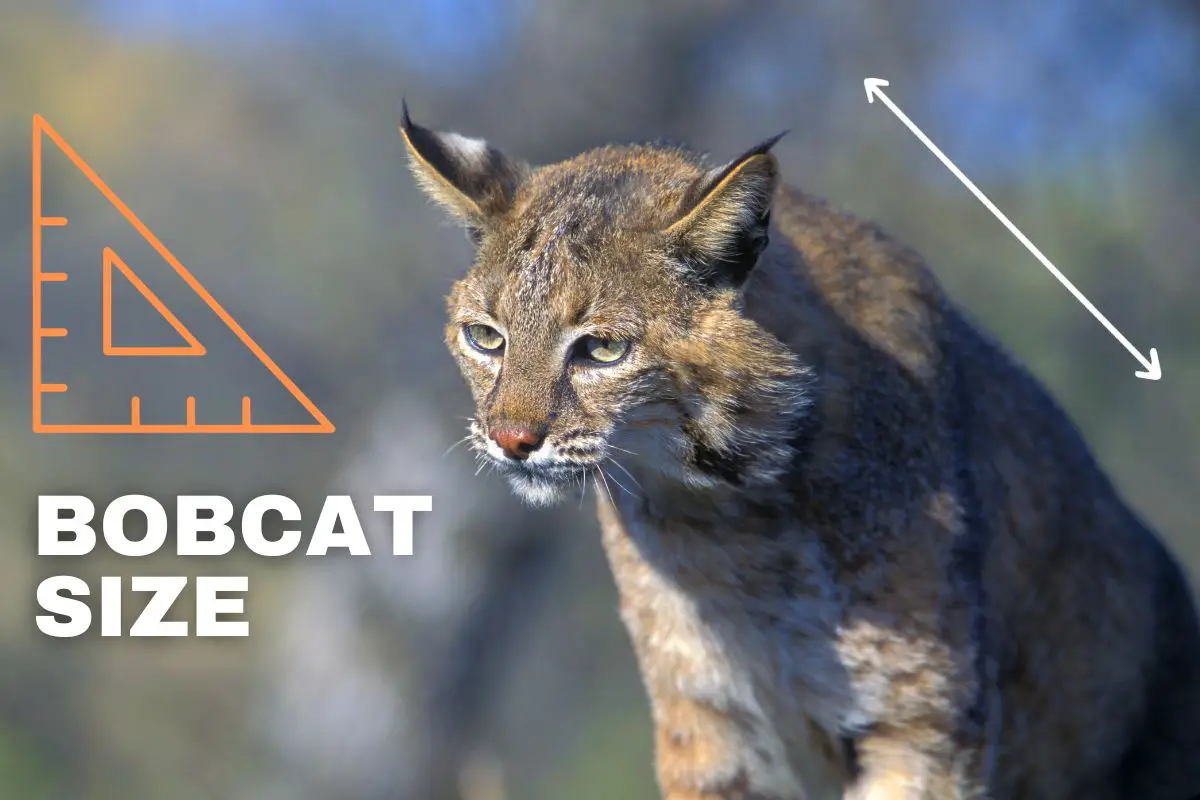When it comes to wild cats, most people’s imaginations can really “run wild”. If you have never seen a bobcat, or have wondered about their size and appearance, then you’ve come to the right place!
I’m going to discuss the size range that you can expect most bobcats to fall into and give you plenty of bobcat photos, videos, and information!
Let’s start with size.
How Big Are Bobcats?
Bobcats are medium-sized wild cats native to North America. Adult males typically weigh between 18 and 35 pounds and measure from 32 to 37 inches in length from nose to tail.
Females are smaller, weighing between 15 and 30 pounds and measuring 28 to 32 inches in length. Bobcats have a distinctive bobbed tail, which measures 9 to 20 cm (3.5 to 7.9 in) long.
Their size and looks can have an impact on their survival capabilities and can impact their maximum running speed, jumping, and hunting traits.
The local environment plays a significant role in their weight and size because if hunting conditions are not optimal, then bobcats may ultimately weigh less if they are not hunting and eating as much.
A good food and water source is extremely important for wildlife.
Bobcat Size Video
First, what’s my background with bobcats? My name is Chad Fox, and I’m an expert on bobcat behavior and relocation.
During my time working on ranches in Texas, I have come across many bobcats! I have also had the opportunity to work with a bobcat as a volunteer in a Zoo.
My first thought when seeing them usually starts with, wow that one is small. Now, don’t get me wrong, I’ve seen some larger ones too, but most of the bobcats where I have lived were in the 25-pound range.
Several other factors can also impact a bobcat’s size and we are going to explore those factors in the following sections. In addition, we’ll be discussing how tall bobcats are and how that compares to their average weight as well.
Bobcat Size Chart
| Bobcat Size | (Adult Male) | (Adult Female) | (Baby Bobcat) |
| Weight: | 15 – 40 lbs | 8 – 34 lbs | 12 ounces |
| Height: | 20 – 50 inches | 20 – 40 inches | 1 – 2 inches |
| Length: | 32 – 37 inches | 28 – 32 inches | 2 – 3 inches |
| Tail Length: | 2 – 6 inches | 2 – 5 inches | ¼ of an inch |
Is a Bobcat Bigger Than a Cat?
Bobcats and domestic house cats can be similar in size. However, most bobcats are larger than a house cat, which gives them the title of a “Big Cat” like other much larger wild cats.
Your average house cat weighs 7-9 pounds. (My cat weighs 14!)
Fat house cats can weigh up to 20 pounds, which puts them in the size range of a small bobcat.
One of the key giveaways for telling the two apart is that a bobcat has a short tail of around 5 inches.
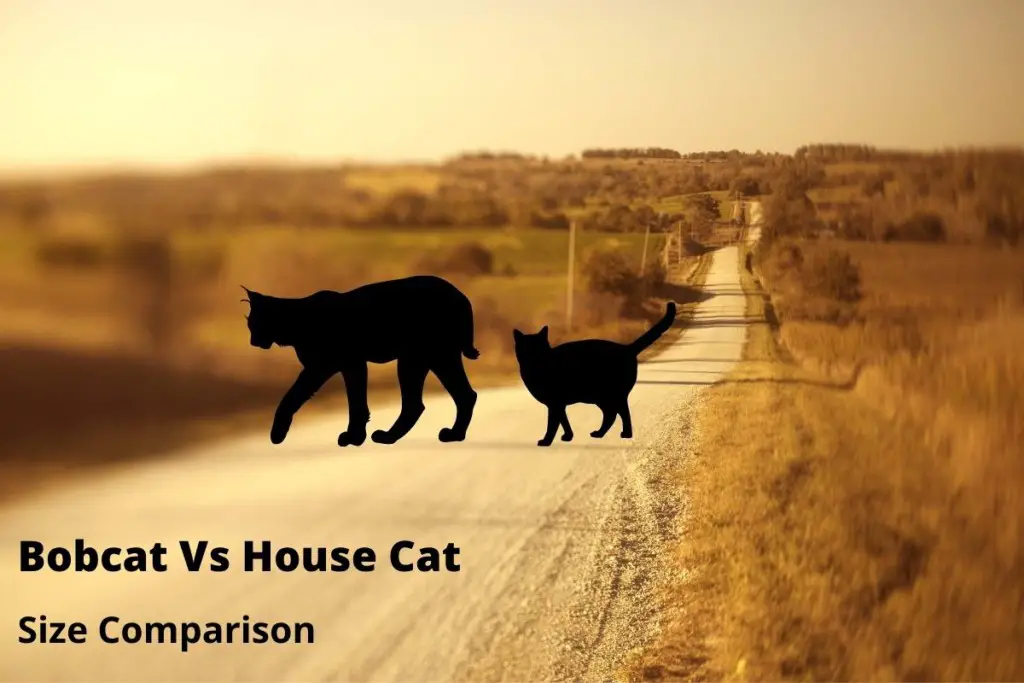
They are smaller than an average cat’s tail and thus they have the name “bob” cats. Below we have a size comparison chart for a bobcat vs. a housecat. Bobcats are around 31.5’ to 47.2 inches long. Source.
How Tall Are Bobcats On Average?
Bobcats can vary significantly in terms of their overall size. Some bobcats are only 20 inches tall while other bobcats are capable of growing up to 50 inches.
Most bobcats have a tail that is approximately 5 inches in length as well, which is much shorter than several other similar animals in the wilderness.
The shorter tail length can harm their balancing capability when walking on higher objects like tree branches.
This is one of the reasons that bobcats generally prefer to stay grounded when hunting, although in some rare cases, you may find them climbing a tree or walking on a tree branch.
See article for Can Bobcats Climb Trees here.
They don’t necessarily need to take advantage of their height to be successful in the wilderness. Bobcats use several of their physical attributes to succeed in the wilderness and this can include their color patterns, speed, height, and agility.
How Much Do Bobcats Weigh?
Bobcats will usually weigh around 25 pounds, but this can depend on their size and local environment. They are usually larger than domestic cats and can be nearly twice as much in some cases.
Bobcats can also vary in weight depending on their diet in the wilderness. They live for approximately 10 years in the wilderness and they can vary in weight throughout their life.
Average Bobcat Weight: 25 pounds
See our article for How Long Do Bobcats Live
The region where a bobcat lives can have a significant impact on its weight. For example, bobcats that live in a forest might have more access to larger prey and therefore may weigh more than a bobcat that lives in an urban area or a desert, where rodents could be the food source.
Bobcats usually eat small rodents, including rabbits and squirrels. They are very capable of being stealthy, despite their varying sizes and weights.
Bobcat Size Compared to Human
Adult humans are generally much bigger than a bobcat. This does not mean that a bobcat is not a danger.
A full-size bobcat next to a human may not look like much in size, however, a wild cat that is frightened can be capable of all kinds of damage.
Humans should keep their distance from bobcats. If you feel you, your pets, or your family are in danger from a bobcat nearby, then you should seek shelter in a house or vehicle.
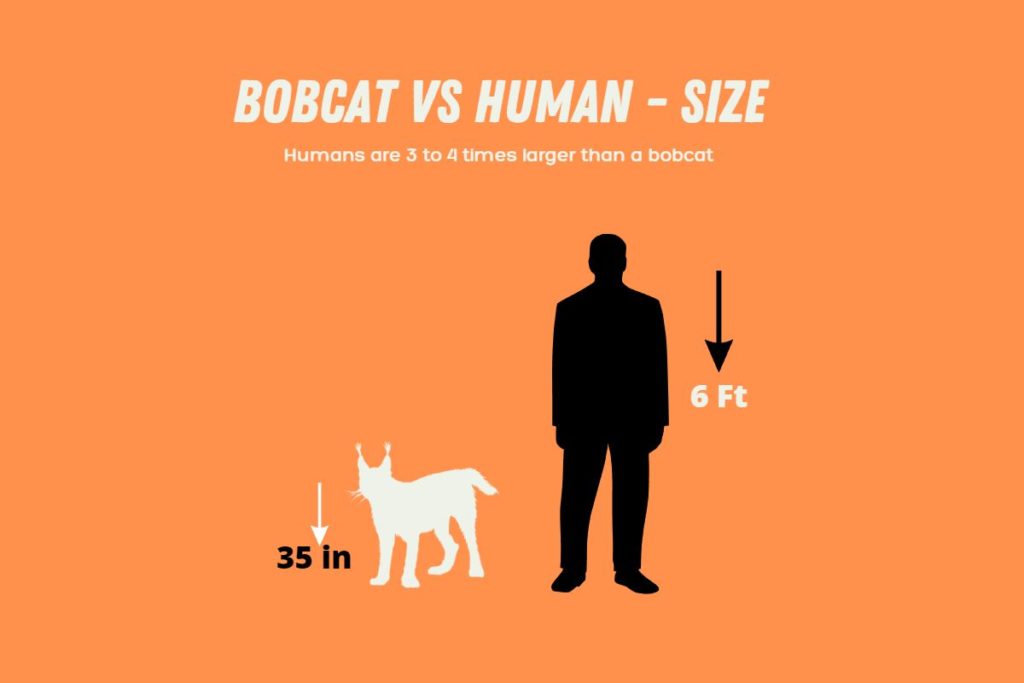
Why Does The Size Of A Bobcat Matter?
Bobcats rely on their size in the wilderness to do a lot of different things that relate to their own survival. This includes hunting, jumping, climbing, and running.
Their size allows them to be extremely agile without sacrificing speed or stealth. In the wilderness, these factors can have an impact on survival capability.
The good news is that bobcats have a stable population because they generally fall into the size categories that are common and ideal.
If the bobcat population started to unexpectedly decline without any reason, one of the first things that would have to be looked at is if an abnormal amount of bobcats are not within their expected estimated size.
The bobcat population in the United States is estimated to be between 2.3 million and 3.5 million.
Bobcats Can Climb Because They Have Strong Legs
Bobcats are tenacious animals and they are determined to survive out in the wilderness. They have a few attributes that allow them to prosper and one of those attributes happens to be an incredible ability to leap and climb.
Bobcats are generally pretty large when compared with a cat, and over time they developed very long legs that can generate a lot of power when climbing.
This can be useful in the wilderness, especially if they are being hunted or chased. Bobcats have been spotted rapidly climbing into trees to escape from predators.
The tenacity that bobcats show out in the wilderness is natural to their species. They are determined to survive regardless of the conditions and they are willing to use their natural traits to survive at all costs.
Their overall size allows them to have the lower-body strength and ability to be able to climb large objects like trees and rocks without much difficulty. Source.
Bobcat Size Vs Dog
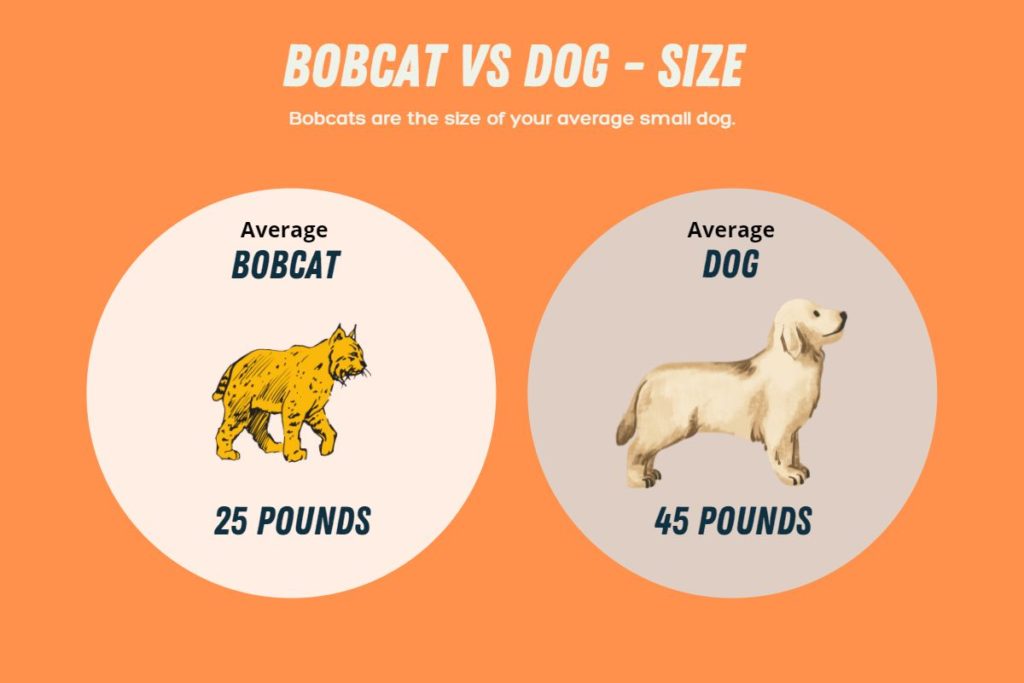
Bobcats are slightly larger than house cats, so they can also be larger than small dogs.
Bobcats are wild animals, so keeping them away from small dogs and pets is critical if you believe there are bobcats living in your area.
Even larger dogs could be in danger if they come up against a wild bobcat.
Both bobcats and small dogs weigh around 25 pounds on average. This means that a bobcat could be the same size as your smaller size furry friend!
Dogs are anywhere between 25 and 65 pounds. So, in general, dogs are usually bigger than bobcats. Guardian dogs can often scare away bobcats, using their size and fierce bark.
Bobcat and Dog Size Comparison
| Average size of a bobcat |
| 25 Pounds |
| Average size of a dog |
| 45 Pounds |
Canids, such as foxes and coyotes can be natural enemies to a bobcat in the wild. This is because sometimes their territory overlaps and they hunt some of the same prey.
This makes them territorial and dangerous.
Oklahoma Bobcat Size
Bobcats love wide-open fields. And Oklahoma provides them with the type of environment that they thrive in.
They can hunt from an abundance of wildlife, such as small mammals, birds like quail and turkey, and more. Oklahoma is definitely a place where you would find a big bobcat.
According to the Oklahoma Wildlife Department, their bobcats are
“From 11 to 30 pounds in weight and 26 to 41 inches in length.”
Source
Oregon Bobcat Size
Oregon is home to multiple subspecies of bobcats. The region is full of places where bobcats can hunt for food. There have been many reports of big bobcats coming out of Oregon.
Bobcats occupy most of the state of Oregon, with the exception of some areas where humans have populated, and at high altitudes.
They prefer to stay in grasslands and open areas, as opposed to high mountain regions. Source.
Big Bobcats
A lot of people may underestimate bobcats after taking a look at their size compared to other animals.
Bobcats are strong and dangerous animals, although it is quite rare that they harm humans. They are excellent hunters and their size plays a small part in allowing them to track down their prey.
They have several important attributes that can allow them to remain stealthy, while also allowing them to climb and jump rapidly.
While it is true that bobcats have a reputation for being similar to domestic cats, they usually weigh around 25 pounds.
As we mentioned before, some adult bobcats weigh as little as 10 pounds while others can up to around 35 or 40 pounds.
What is the biggest bobcat ever caught? Most records come from a bobcat killed in Wisconsin, that was 52 pounds. Source.
Now, onto the best part.
Bobcat Appearance
What do bobcats look like? Bobcats have a distinctive appearance with a coat that is tan, brownish, and tawny. Their body can have banding or spots that are usually a darker color.
They have black tufts on their ears and short 5-inch tails. The backs of their ears have eye spots on them (called ocelli).
It’s certainly possible that you could mistake a bobcat for some other animal if you are unaware of its physical appearance.
They are extremely tough to find out in the wilderness because they are considered to be nocturnal.
This means that they usually only wander around at night and they can be extremely elusive when moving around.
How to Identify a Bobcat
If you want to identify a bobcat in the wilderness, then there are certain things that you are going to want to look for.
They are commonly recognized by their tail, simply because bobcats have a tail that is around 5 inches in length and has a black-tipped color pattern.
Their ears can be a giveaway as well since they have black tufts of fur on the tips of their ears.
Common Bobcat Color Patterns
It’s very common for bobcats to have different color patterns. For the most part, bobcats can be identified with a dark brown or reddish fur coat with dark spots and stripes.
They often have white fur on their bellies and they can have tails with black-tipped color patterns, however, on a bobcat, the underneath of the tail is almost always white (in my own experience of viewing bobcats).
In some cases, bobcats can have a grayish color pattern. However, most of the time, bobcats will have brown or reddish coats.
You might also notice that most bobcats have black tips on their ears and their ears have tufts that point up. Source.
There have been some reports of individuals seeing black bobcats. These reports are extremely rare but there have been some cases reported that have suggested that there might be some bobcats that have entirely black fur coats, due to melanism.
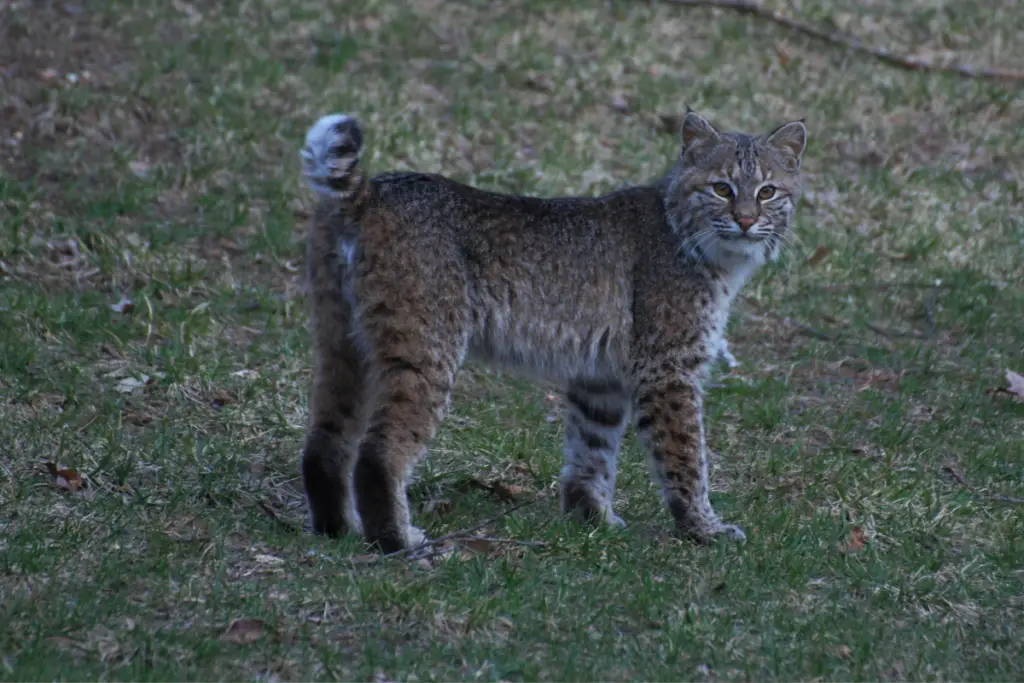
Bobcat Tail
The bobcat’s tail is one of the most recognizable parts of its body. Their tails are around 5 inches long.
The tails are not as long as other cats because they hunt mostly in open fields.
They did not have to evolve to a bigger tail. The smaller tail moves less and helps them stay elusive to their prey.
Other cats have longer tails because they need extra balance while navigating much narrower terrain.
The bobcat’s habitats and territory have eliminated this need. They were named “bobcats” because of their small tail.
See our article for Bobcat Habitats and Territory
What Do Baby Bobcats Look Like
Bobcat kittens can appear to be the same size as most kittens. One key detail that you can use to identify bobcat kittens is that they are always born with dark spots and stripes.
Baby bobcats are called kittens, and bobcat litters usually consists of 1-6 kittens, with 4 kittens being the most common.
Baby bobcats are usually born with blue eyes or light-colored eyes. Later their eyes turn a yellow color with round black pupils.
How Do Bobcats Compare To Other Similar Animals?
Many individuals can mix up bobcats with other animals. In this section, you will have the opportunity to compare the bobcat to two different animals that are commonly mistaken for bobcats.
Cougars and coyotes can be mistaken for bobcats but there are usually a few clear indicators that separate them apart.
Coyotes Vs Bobcats
Bobcats are about half the size of most coyotes. They generally live in the same types of environments but bobcats are much more elusive and stealthy than coyotes.
If you are checking for animal tracks, it’s important to remember that bobcats don’t have claw marks on their foot tracks while coyotes do, this is due to the bobcat’s retractable claws.
Cougars Vs Bobcats
Cougars are much larger than bobcats and can weigh more than five times as much.
Some cougars can sprint up to 50 MPH, while bobcats have only ever been witnessed running up to 25 MPH.
They can have similar colors but a cougar’s size will usually be a clear indicator that it is not a bobcat, simply because they are so much larger than most bobcats.
Other Important Bobcat Traits
Bobcats can jump and leap much further than traditional cats because of their long legs and larger overall size.
They are extremely skilled at climbing and jumping, allowing them to roam around mountainous regions if needed.
Bobcats have been seen jumping and leaping more than 10 feet at a time!
If you happen to come across a bobcat sprinting at full speed, you might be surprised to witness that they are capable of exceeding 25 MPH.
They can run much quicker than you might imagine, but that doesn’t necessarily mean that they will use their speed for hunting purposes.
Bobcats are much more comfortable with hunting stealthily. They prefer to remain patient, elusive, and secretive when hunting.
They commonly use their fur’s color pattern to blend in with the environment before sneaking up on their prey. Source.
Sources
Here are the resources and sources that were used to put this together!
https://mnmammals.d.umn.edu/bobcat
https://meridian.allenpress.com/jfwm/article/1/2/169/206731/Bobcat-Population-Status-and-Management-in-North
https://www.pgc.pa.gov/Education/WildlifeNotesIndex/Pages/Bobcat.aspx
https://www.wildlifedepartment.com/wildlife/field-guide/mammals/bobcat
https://myodfw.com/wildlife-viewing/species/cats
https://www.twincities.com/2009/02/07/bobcat-a-record-for-wisconsin-maybe-north-america/
https://tpwd.texas.gov/huntwild/wild/species/bobcat/
https://www.in.gov/dnr/fish-and-wildlife/wildlife-resources/animals/bobcats/
Arnold, Caroline; Hewett, Richard, ill, Bobcats, Lerner Publications,(1997)
Frequently Asked Questions
The average weight for bobcats is around 15 to 40 pounds. A large bobcat would be 40 pounds or larger. The female bobcats are always smaller than the male bobcats.
Bobcats are the smallest of the wild cats of North America. They are the smallest of the lynx species, smaller than the Canadian lynx, and the Eurasian lynx. However, they can still be large enough to be fierce animals in the wild.
Bobcats generally do not like to cross paths with humans. They are solitary and they are very good at hiding and blending in with their environment. It can be rare to see a bobcat, but sightings do happen.
- Hero Farm Dog Survives Epic Battle with Coyote Pack - December 9, 2024
- The 10-Minute Bedtime Routine That Changed My Dog’s Sleep Forever - November 29, 2024
- Creating a Safe Space for Nervous Pets: Your Guide to Pet-Friendly Havens - November 25, 2024

